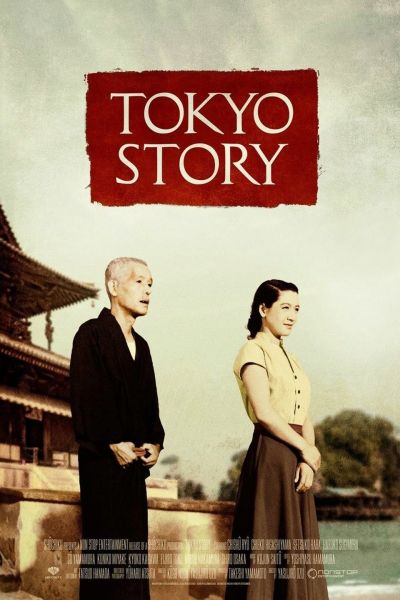Tokyo Story

Description:
Tokyo Story follows an aging couple, Shukichi and Tomi Shimamura, who travel from a provincial town to visit their grown children in Tokyo. The visits reveal warmth and quiet distance, as the children prioritize work and social obligations over time with their parents. Ozu's restrained, precise storytelling, with a low, fixed camera, builds a moving meditation on memory, family, and generational change. Its tenderness remains a landmark in world cinema.Keywords:
Everyday Life, Drama, Family Drama, Japanese CinemaWhy is Tokyo Story a great movie?
"Tokyo Story," directed by Yasujirō Ozu, is considered a great movie due to its profound exploration of family dynamics, generational conflict, and the passage of time. The film's understated storytelling, minimalist style, and meticulous composition create a poignant atmosphere that resonates with viewers. Ozu's use of everyday moments and dialogues highlights the emotional complexities of relationships, making it universally relatable. Its themes of love, loss, and alienation have left a lasting impact on cinema, influencing countless filmmakers and earning its place as a masterpiece of world cinema.
Is Tokyo Story a sequel to Late Spring?
No, "Tokyo Story" is not a sequel to "Late Spring." Both films are directed by Yasujirō Ozu and share thematic elements, such as family dynamics and generational conflict, but they are standalone works. "Late Spring" (1949) focuses on a daughter’s relationship with her widowed father and her eventual marriage, while "Tokyo Story" (1953) depicts an elderly couple visiting their children in Tokyo, exploring themes of neglect and familial disconnect. Both films are critically acclaimed but are separate narratives.
What happens in Tokyo Story?
"Tokyo Story," directed by Yasujirō Ozu, follows an elderly couple, Shukichi and Tomi Hirayama, who travel from their rural hometown to Tokyo to visit their children. Upon arrival, they find their children, busy with their lives, largely indifferent and preoccupied. The couple's attempts to reconnect highlight themes of generational disconnect and familial duty. Ultimately, Tomi falls ill, and after her death, the children reflect on their neglect. The film poignantly explores the complexities of family relationships and the passage of time.
What is the message of the Tokyo Story?
"Tokyo Story," directed by Yasujirō Ozu, explores themes of generational conflict, family, and the passage of time. The film portrays an elderly couple who visit their children in Tokyo, only to find themselves neglected and misunderstood. Its message highlights the emotional distance that can arise in modern life, particularly as traditional values clash with contemporary priorities. Ultimately, it underscores the importance of familial bonds and the bittersweet nature of life, urging viewers to appreciate their loved ones before it's too late.
Explore More Categories:
Sports Drama Video Games Adventure Period Piece Step Siblings Chase Sci Fi Thriller Corporate Espionage Documentary Rituals Comet Monster Nightmares Coming Of Age Drama Distance Parenthood Racial Tension Misadventure Paranoia Artifacts Telekinesis Holocaust Media Ethics Parody Father Daughter Relationship